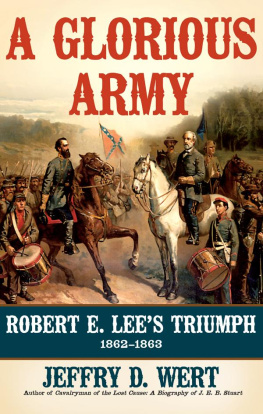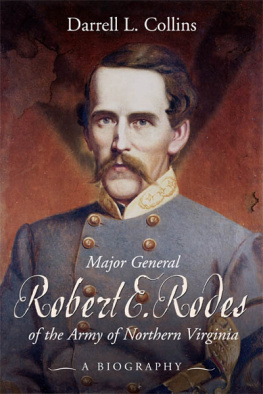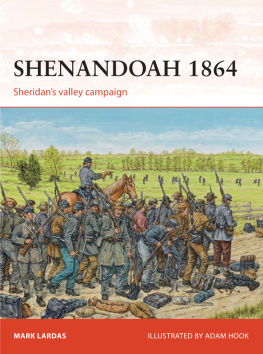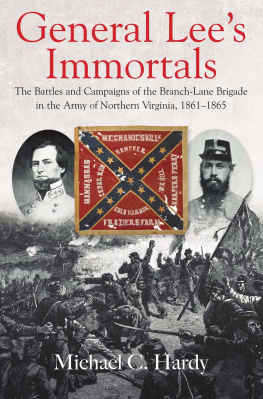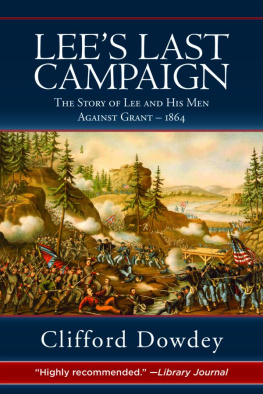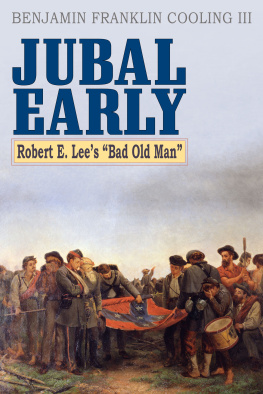A Gunner in Lees Army
CIVIL WAR AMERICA
Gary W. Gallagher, Peter S. Carmichael, Caroline E. Janney, and Aaron Sheehan-Dean, editors
This landmark series interprets broadly the history and culture of the Civil War era through the long nineteenth century and beyond. Drawing on diverse approaches and methods, the series publishes historical works that explore all aspects of the war, biographies of leading commanders, and tactical and campaign studies, along with select editions of primary sources. Together, these books shed new light on an era that remains central to our understanding of American and world history.
This book was published with the assistance of the Fred W. Morrison
Fund for Southern Studies of the University of North Carolina Press.
2014 The University of North Carolina Press
All rights reserved
Designed and set in Merlo types by Rebecca Evans
Manufactured in the United States of America
The paper in this book meets the guidelines for permanence and durability of the Committee on Production Guidelines for Book Longevity of the Council on Library Resources.
The University of North Carolina Press has been a member of the Green Press Initiative since 2003.
Cover illustration: Postwar watercolor portrait of Thomas Henry Carter in Confederate uniform. Courtesy of James F. Turrell.
Library of Congress Cataloging-in-Publication Data
Carter, Thomas Henry, 18311908.
A gunner in Lees army : the Civil War letters of
Thomas Henry Carter / edited by Graham T. Dozier.
pages cm.(Civil War America)
Includes bibliographical references and index.
ISBN 978-1-4696-1874-6 (pbk : alk. paper)
ISBN 978-1-4696-1875-3 (ebook)
1. Carter, Thomas Henry, 18311908Correspondence. 2. United StatesHistoryCivil War, 18611865Personal narratives, Confederate. 3. Confederate States of America. ArmyOfficersCorrespondence. 4. SoldiersConfederate States of AmericaCorrespondence. 5. United StatesHistoryCivil War, 18611865Artillery operations, Confederate. 6. Carter, Susan Roy, 18341902Correspondence. I. Dozier, Graham T., editor. II. Title.
E605.C29 2014
973.782092dc23
2014007433
18 17 16 15 14 5 4 3 2 1
FOR MY FATHER
Contents
CHAPTER ONE
Life before the War
CHAPER TWO
1861
CHAPTER THREE
From Northern Virginia to the Peninsula
CHAPTER FOUR
To Maryland and Back
CHAPTER FIVE
Winter Quarters
CHAPTER SIX
Guarding the Rapidan
CHAPTER SEVEN
From the Wilderness to the Valley
CHAPTER EIGHT
Wars End
CHAPTER NINE
Life after the War
APPENDIX
Selected Genealogy of the Thomas Henry Carter Family
Illustrations
Letter written by Tom Carter to his wife, Susan, on 23 October 1862
Susan Roy Carter, ca. 1858
Robert E. Rodes
Robert E. Lee
Thomas J. Jackson
Postwar portrait of Tom Carter in Confederate uniform
John B. Gordon
Jubal A. Early
Pampatike, King William County, Virginia
Tom Carter in the 1870s
Tom and Susan Carter posing with students at the University of Virginia in the late 1890s
Foreword
Artillery officer Colonel Thomas Henry Carter witnessed the rise and fall of Robert E. Lees Army of Northern Virginia, but he did not describe his escapades as a crusade of heroism or as an epic adventure. Carter simply refused to write theatrical war stories, the kind of sensational copy that played well with general audiences at home. He had seen too much blood to be seduced by the drama of battle. In his lengthy and richly detailed letters to his wife, Susan Roy Carter, he wrote with a fearless realism, an approach that brings the reader into the many dimensions of organized warfare that include the battlefield, military leadership, discipline in the ranks, religion, Confederate nationalism, privations on the home front, and the collapse of slavery. All of these subjects Carter scrutinized with a critical detachment that eluded most of his peers, who typically chronicled the hard facts of their existence as if their letters were hard truths carved in stone tablets. Although Carters perspective flowed from a deep political and ideological commitment to the Confederacy and its slaveholding class, he was not afraid to fire a critical shot back at his nation for its military failures or internal shortcomings. His ability to break with the official voice of his countrya message that always proclaimed the superiority of southerners in all things and rarely admitted any deficiencyis truly exceptional. Carter, for instance, thought that Northern armies were more successful in disciplining their troops than the Confederates, whose independent dispositions encouraged acts of self-preservation under fire that bordered on cowardice. Carter, who favored any measure that advanced Confederate military authority over the rights of the individual, blasted his government for lacking an effective bureaucratic apparatus to punish or banish questionable officers who allowed their men to run amuck on the battlefield. We are anxious to remodel the army organization, Carter opined in 1864, to abolish the elective system for officers & to inaugurate a discipline which will make the men obey on the battlefield & elsewhere. Unless we do we are lost. The Yankee discipline is immeasurably superior to ours.
Carters penetrating criticisms were not those of a bitter outsider. In rising up the ranks to eventually command the artillery of the famed 2nd Corps, Carter rubbed shoulders with some of the most prominent officers of the army, including Lee, Thomas Stonewall Jackson, Jubal Early, John B. Gordon, and Richard Ewell. His opinions, on the whole, offer a balanced commentary on the merits and weaknesses of these famous men, though at times he could be vicious in his characterizations of his fellow officers. No other set of letters from a veteran of Lees army evaluates Lees lieutenants with such brutal honesty. Yet his frank opinions are not distorted by personal ambition or darkened by jealousy. In the fall of 1864, after a string of Confederate defeats in the Shenandoah Valley, he wrote that his commander Early is smarting under the newspaper articles at this time. His civil & political life renders him particularly sensitive to these strictures. I have known no man in the army so morbidly sensitive on this subject as himself. His jealousy & hatred of Gordon is openly displayed, a most unfortunate circumstance, for could they work in harmony a great victory might be won. I believe Early to be a patriot but a selfish man who is desirous of monopolizing all the glory. Though Early had lost favor with Carter, the latter had the capacity to empathize with those in command, knowing that the helter-skelter nature of warfare often exceeded the powers of any man, regardless of their natural military abilities or leadership style.
Although Carter breathed the rarified air of the Confederate high command, he never lost his feel for the ground level of war. His deep concern for his wifes welfare, who remained on the familys extensive plantation in King William County, Virginia, and his need to manage his farm and slaves from afar made him extremely sensitive to how the war had ripped apart the lives of his fellow southerners and how all men, regardless of rank, were caught in a crossfire of demands that weakened their military reliability. Rarely did he reduce the outcome of a battle to simple questions of duty or courage. He understood that the men in the ranks were not only soldiers but also husbands and fathers whose worries extended beyond showing up for roll call or doing guard duty. Men were pulled in conflicting and contradictory directions, and the preservation of self and family often trumped the high ideals of a national cause. Food shortages, runaway inflation, and labor demands were the cries for help that all men heard from home. Carter encountered similar problems, especially with his slaves, who were not as compliant as he would have preferred when the Yankees were in his neighborhood. These troublesome issues weighed upon Carter, whose letters demonstrate that no soldier was insulated from the disruptions of the home front. He lashed out at free blacks for their entrepreneurial spirit, since they took advantage of the simple laws of supply and demand in charging more for their goods. Carter was also frustrated with his own slaves, especially those who accompanied him in the army. He never saw them as loyal and trusted Confederates ready at any moment to shoulder a gun for the cause, but as unruly and unreliable rascals who lost their sense of loyalty when Union armies were in close proximity. These dislocations at home did not discourage Carter. He thought the war was a fight to the death for a political and social world where he and his family stood at its very pinnacle of power.


